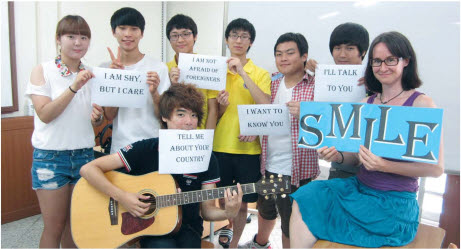September is a time when a lot of new teachers and students come to Korea to start their lives here, be it for a short time or a longer time, so here are some reflections for the new foreigners and the Koreans whom they may meet which I hope can help the adjustment.
Life abroad
There is a lot that people who’ve never sojourned don’t understand about the situation of being an outsider in a foreign land. There is a lot to adapt to; for example, why are Koreans so careful not to touch the rim when they share drinks from a can or bottle, but have no problem sharing the same cup? It is not that I mind sharing, but it is this kind of inconsistent logic that foreigners often try, unsuccessfully, to understand. In the beginning, “But… it
A Word to foreigners
Life in Korea is not always--ok, not often—easy: it’s a challenge and an uphill climb, but it is a journey worth taking. What I have found from interaction with people and lots of conversations is that community is the biggest factor to a satisfactory, or I dare say happy, life in Korea. Some people, like me this past year, might be blessed with a beautiful group of co-workers that are there when you need them or with classmates, if you’re a student. If you are religious, many churches are open to foreigners and have services in English. Even if you’re not, there are events, interest clubs and social hangouts in your area which cater to international residents. Find out what’s available. If you’re an international student and your school doesn’t do enough to help you adapt to life, then let the necessary people know. If they don’t know what you need, they can’t help you get it. Perhaps you might consider this push to action a North American perspective; maybe you’re worried about voicing your needs or concerns especially in an unfamiliar place and a hierarchical society, but are you happy? Sure, you risk your request being denied or simply ignored (I’ve certainly experienced both), but if you don’t ask, isn’t it almost guaranteed that you won’t get what you’re hoping for? Certainly you have to think about how best to speak up, but do speak up.
Also, as foreign residents, don’t we have a responsibility not only to try and introduce our own culture but also to try and understand Korean culture? If not, why are we here? Sure, there are many Koreans who still fear us (and run away when we approach) but there are plenty who want to get to know us, so please keep trying. Finally, please take a step back from righteousness and think about what right we have to demand Koreans speak English (as a world language) if we make little attempt to learn Korean while here, especially being fully aware of how knowing it would make life easier.
A Word to Koreans
Please reflect on how you interact with foreigners. We’re not aliens, and we don’t bite. Most foreigners appreciate attempts at communication, even if your language ability isn’t as high as you’d like it to be and even if it’s not successful; at least we could feel that you valued us enough to try. If you want to become friends with a foreigner, to learn about other cultures and the world, then act as a friend would. Consider the challenges we face, be open-minded, look beyond what you see, and take a big, deep breath of courage.
A Final Word to All
Connection is a basic human need. Too many people feel alone, yet the only walls separating people are invisible and often fear-based. Brave people walk through these walls. They get to know others through a variety of activities, even if it requires stepping out of their comfort zones. Fight against isolation when you’re tempted to isolate yourself, when you feel you’re being pushed into it, or when you see it happening to others. Reach out a hand and reach out your heart.
- 기자명 GLOBE
- 승인 2012.09.04 13:30
- 댓글 0

